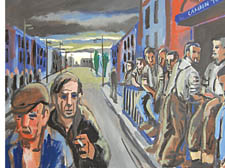|
|
 |
| |

In ‘Early Morning, Camden Town’, Irish painter Bernard Canavan depicts his compatriots
waiting for work outside the Tube station |
A blinkered distortion of our history
Peter Beresford Ellis draws on personal
experience to debunk a skewed history of
the Irish working class in post-war Britain
THE IRISH IN POST-WAR BRITAIN
By Enda Delaney.
Oxford University Press
MY father arrived in London in 1924 to become a crime reporter in Fleet Street. He had “made his bones” on newspapers in his native Cork, the USA and France. He was one of those whom Professor Roy Foster once referred to as “Micks on the Make”.
Enda Delaney reminds us of those journalists, doctors, lawyers and other Irish professionals of the period who found, due to the policies which had governed Ireland, that England was the only close place to their country where they could expect to expand their careers. He repeats Foster’s patronising comment.
My family left London to live in the provinces. I, in turn, made my bones as a reporter on Sussex newspapers before arriving in London in the spring of 1964. That was a learning curve as I began to look for lodgings and was confronted with the signs – “No Blacks, No Irish, No Dogs”.
Dr Delaney, in pages that might make a politician envious by his ability to allow different interpretations of what he is saying, seems to be encouraging people to believe that such signs were merely proverbial myths. He adds, as if in regret: “No one has, as yet, set themselves the almost impossible task of disproving their existence!”
That word “almost” is interesting. The signs were really there, brazenly displayed in the lodging house windows and boards at corner newsagents’ shop. I saw them but, reading this tome, my testimony would not impress Dr Delaney who believes its all “oral mythology”.
Dr Delaney’s is a strictly academic book and, sadly, I think he is writing for his fellow academics, and, even more sadly, academics of a certain political complexion. It is more an attempt at sociology than real history and not good sociology at that.
There is no flesh on the bones. No real impression given of the suffering that most Irish migrants went through as they made the transition from their homeland to England. Arriving in towns like London was an alien enough experience for English country folk but for the Irish, with a different culture and attitude, it was almost impossible to escape the suffering, depredation and poverty that placed them in ghettos.
The current volume only becomes interesting by the facts that it seems to carefully omit. In talking of the Irish involvement in politics in Britain, there is no mention, or even quotations from, the London base political monthly journal The Irish Democrat, which was launched in 1939, as the journal of the Connolly Association (CA). The Irish Democrat was one of the most influential political journals and subscribed to by many left-wing British politicians and MPs. It survived until 2007.
Surely the CA and its newspaper are an invaluable archive of the history this book is suppose to enumerate? For Dr Delaney, they don’t exist. There is no mention of the republican organisations in Britain like Clann na héireann working out of offices in Fulham in the 1960s and 1970s with its monthly newspaper Rosc Catha, nor the Irish Prisoners Aid Societies run for Irish prisoners in British jails.
More importantly, there seems no mention of the Irish in Britain Representation Group founded in 1981 which was certainly one of the strongest and most active groups among the Irish migrant population. It was founded to promote a more positive Irish identity, fight anti-Irish racism and seek more representation of the Irish community.
The Irish Post, the Irish World, the Irish Echo and other Irish in Britain newspapers launched in the last half of the 20th Century, are not mentioned let alone referred to as source material. Admittedly, its hard to judge overall content fairly when Dr Delaney confuses the reader by eschewing the traditional chronological structure in favour of a thematic basis. In this, he is not helped by the mis-references of the index.
The history of the Irish in Britain still badly needs to be written.
|
 |
|
|
 |
 |
|
 |
|


